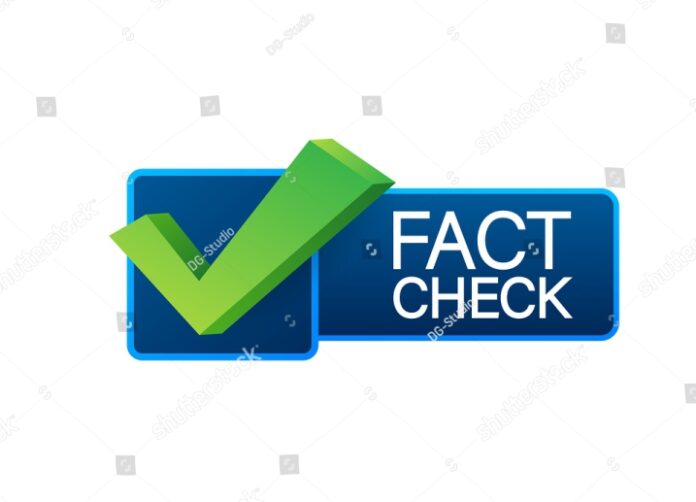Combating Fake News Through Fact-Checking
By Abbas Badamasi
TECH DIGEST – It is obvious that getting news about events and incidents has absolutely been made so easy nowadays. Whatever happens, become public knowledge in a matter of minutes. There are a lot of news breakers around apart from the media-the Twitter and Facebook users and Bloggers, etc.
The news breakers are no longer necessarily the conventional media organizations we know such as radio, television or newspapers, though they could at times be, but, social media platforms have to a great extent taken the lead in breaking news, and even giving real-time updates or have some short footages which give the news in multimedia form.
Certainly, this is a good side of social media, that is, breaking the barrier of having to wait till a certain time to get information or news about happenings.
I can say almost 80% of smartphones have social media apps downloaded and installed on them, this then means that majority of smartphone users have social media accounts and access those accounts to socialize and get updates. No doubt we surely are living in a global village.
Getting news and information comes with some consequences; these consequences include consuming fake news and sharing the fake news to others as genuine information knowingly or unknowingly. There are always contaminated pieces of news in circulation online regardless of whether or not there is an event. It is as if makers and peddlers of the fake news do not sleep at all.
It is also as if they mind the business of fake news trading so much that they research to understand the psychology of readers so they can easily sell some false narratives to them without understanding.
This is so because you will sometimes come across reputable or knowledgeable people sharing fake news to people in their network, and if you are a curious mind or fact-checker you then will begin to wonder why they are sharing the piece with you even though they should ordinarily not have shared it without doing some fact-checking, or rather establishing the truth of claims they share.
The simple answer here is that they might have been emotionally conquered to want to break some news without ensuring its authenticity or they have a motive of doing that. Either way, the quick trick to combating fake news is conducting a fact check on pieces of news or information we receive before we share them with others.
Fact-checking involves asking questions such as: what did the lead and body of the story or claim say, is there variance or agreement, who is reporting the piece, the media organization? How credible is that medium, have other sources reported the same piece? What did they say? What genuine sources have the media used to arrive at what they say? Is it an individual reporting or giving the news? What source has he or she relied on to tell the story? Does the story involve some organizations, government, individuals, authorities? Have authorized personalities of these organizations, governments, individuals, authorities been contacted? Did these authorized personalities or parties involve updated their social media accounts (if they have) about the events they are being reported on? There are certainly a number of questions to ask and get answers to be able to establish the truth of a piece of news or information we come across. Fact-checking is indeed worth doing as the danger of fake news is greater than we ordinarily think.
At times thorough reading and simple examination on a piece of story or information can quickly help us determine how true or fake some claim or narrative is. Many fake news pieces will fail to give information as to who said what¸ where, when, before who, etc. When any piece of news fails to answer these basic journalistic storytelling criteria, the suspicion must be raised. And surely sharing the piece should not happen because you may end up sharing fake news.
Everyone can conduct fact-checking and if we all fact-check stories and information we receive, fake news and disinformation will have no place, and we will eventually rid our societies of the menace of fake news.
Already fake news has done great harm to efforts at curbing the spread of COVID19 with several false narratives around the virus, its vaccine and immunization. And because people don’t care to fact-check and find genuine information about not only Coronavirus but other issues, a large chunk of our population has been misled into believing lies as truths. This is a serious danger we must collectively confront and defeat. Fact-checking is a great tool to combating fake news. And it is easy to fact-check because sometimes the sources to contact and verify issues are in our network.
Becoming a fact-checker does not really require hard skills. However, what is most important is reasoning and having the critical mind to be able to raise and seek answers to basic questions around pieces of stories and information we come across particularly online.
You never know how impactful the verification you conduct will be. The danger of allowing fake news to go unchecked is that other people out there will have it as genuine information which is truly dangerous. Some fake news instances mobilize people into violence against each other, others pose health risks or promote political instability and celebrate tribal and religious intolerance.
We, therefore, have a role to play in ridding our societies of the dangers of fake news and disinformation which have nowadays become common. We can do that by fact-checking stories and information we come across especially online. Do a fact-check on any suspicious story you come across, inform and enlighten the public about it.
Abbas Badamasi is a staff of PR Nigeria and Editor @ TechDigest.Ng
















